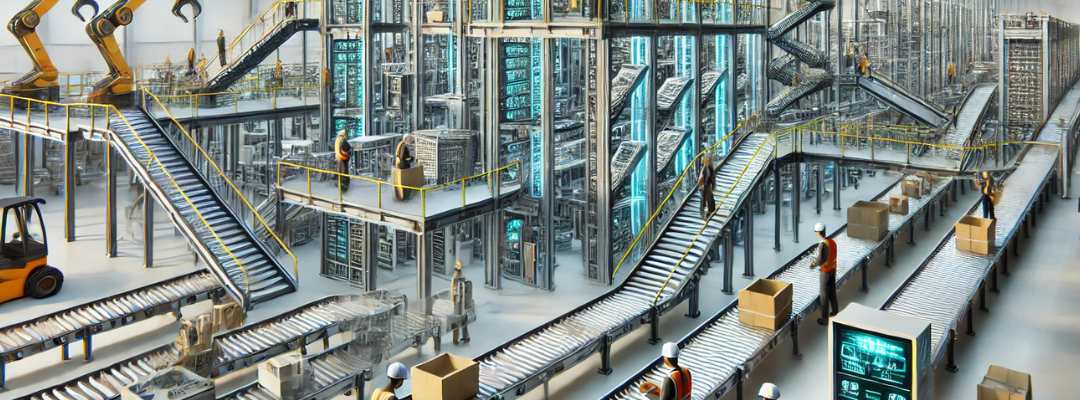In the ever-evolving landscape of material handling, efficiency, adaptability, and cost-effectiveness are paramount. Modular conveyor systems are emerging as a revolutionary solution, meeting the needs of industries ranging from manufacturing and logistics to retail and e-commerce. Their flexibility, scalability, and ease of use make them an indispensable part of modern operations. This article delves into the reasons why modular conveyor systems are the future of material handling and how they can benefit your business.
1. What Are Modular Conveyor Systems?
Modular conveyor systems consist of pre-engineered, interchangeable sections or modules that can be assembled and reconfigured to suit specific operational needs. These systems are designed for adaptability, allowing businesses to modify layouts and add components without extensive downtime or costs.
Key Features:
- Interchangeable Modules: Include straight sections, curves, inclines, declines, and merges.
- Plug-and-Play Design: Easy to assemble and disassemble.
- Customizable Configurations: Can be tailored to specific requirements.
2. Advantages of Modular Conveyor Systems
a. Flexibility and Scalability
Modular conveyors can be easily expanded or reconfigured to accommodate changing operational needs, such as increased throughput or new workflows. This flexibility is ideal for:
- Growing businesses.
- Seasonal operations with fluctuating demands.
- Facilities undergoing layout changes.
b. Cost Efficiency
- Reduced Initial Investment: Modular systems allow for phased implementation, spreading costs over time.
- Lower Maintenance Costs: Standardized components are easy to replace and maintain.
- Minimized Downtime: Quick reconfiguration means less disruption to operations.
c. Ease of Installation and Relocation
The lightweight, plug-and-play design of modular conveyors simplifies installation and relocation, making them ideal for:
- Temporary setups, such as event logistics.
- Facilities with limited installation time windows.
- Businesses that frequently move operations.
d. Sustainability
Modular systems promote sustainability through:
- Compatibility with automation and energy-saving technologies.
- Reusable components that reduce waste.
- Energy-efficient designs that lower power consumption.
3. Applications Across Industries
a. Manufacturing
- Assembly line integration.
- Movement of raw materials and finished goods.
b. E-commerce and Retail
- Order fulfillment and sorting.
- Packaging and distribution.
c. Food and Beverage
- Hygienic transport of perishable goods.
- Flexible layouts for seasonal products.
d. Pharmaceuticals
- Safe handling of sensitive products.
- Compliance with stringent regulatory standards.
4. Technological Advancements in Modular Conveyor Systems
a. Smart Sensors and IoT Integration
- Real-time monitoring of conveyor performance.
- Load detection and precise control for optimized operations.
b. Automation Compatibility
- Integration with robotics and automated sortation systems.
- Enhanced workflow efficiency through AI-driven systems.
c. Energy Efficiency
- Use of low-power motors and energy-saving components.
- Regenerative braking to reduce energy consumption.
d. Advanced Materials
- Lightweight yet durable materials for enhanced portability and longevity.
- Use of antimicrobial coatings for hygiene-sensitive industries.
5. Challenges and Solutions
a. Initial Cost Perception
While modular systems may have higher upfront costs, their long-term savings and flexibility often outweigh the initial investment.
b. Integration with Legacy Systems
Older systems may require upgrades to work seamlessly with modular conveyors. Partnering with experienced providers ensures smooth integration.
c. Training Requirements
Employees may need training to adapt to new systems. Modular designs with intuitive interfaces minimize learning curves.
6. Case Study: Modular Conveyor Success
Company: ABC Logistics
Challenge: Managing seasonal spikes in order fulfillment.
Solution: Implemented a modular conveyor system that allowed rapid reconfiguration for peak demand periods.
Results:
- 30% increase in throughput.
- 50% reduction in downtime during reconfiguration.
- ROI achieved within 12 months.
7. Future Trends in Modular Conveyor Systems
a. Increased Automation
- Fully autonomous modular conveyors powered by AI.
- Enhanced connectivity with warehouse management systems (WMS).
b. Eco-Friendly Designs
- Use of recycled materials in construction.
- Systems powered by renewable energy sources.
c. Customization at Scale
- On-demand manufacturing of custom modules.
- Industry-specific designs for niche applications.
d. Predictive Maintenance
- AI-driven diagnostics for real-time issue detection.
- Reduced maintenance costs and downtime.
Conclusion
Modular conveyor systems are revolutionizing material handling by offering unparalleled flexibility, efficiency, and sustainability. Their ability to adapt to changing business needs, integrate with advanced technologies, and provide cost-effective solutions makes them the future of the industry.
Whether you’re a small business looking to optimize processes or a large enterprise aiming to scale operations, modular conveyors offer the versatility and performance required to stay competitive in a dynamic market. Invest in modular conveyor systems today to future-proof your material handling operations.

